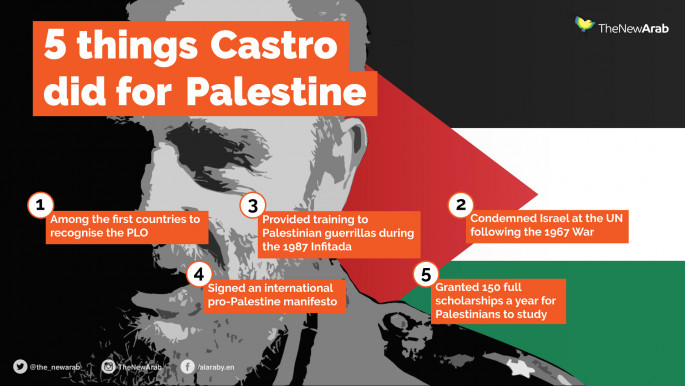
Cuban leader Fidel Castro was also a pro-Palestine president
In a frequently cited interview with Jeffrey Goldberg of The Atlantic in 2010, the late Cuban revolutionary leader Fidel Castro said Israel had "without a doubt" a right to exist.
The icon of the global Left had "nothing but sympathy" for the persecution of Jews through history and for the Israeli state, he told Goldberg.
When asked whether Israel and Cuba could repair relations, Castro - then four years into his medically-induced retirement - did not outright reject the idea.
However the historic leader's conciliatory remarks were only a fleeting diversion from decades of fierce criticism of Israel and its policies.
Havana broke diplomatic relations with Israel after the 1973 October War as he sought to strengthen ties with Arab countries in the Non-Aligned Movement - a group of states that are not formally aligned with or against any major power bloc.
With this he opposed Arab states who were opposed to Israel's existence, and put Cuba in a hard-line camp opposed to the country.
Cuba's relations with Israel remained frosty over the years, even as some Arab states began to open up talks with the Tel Aviv.
Castro's support for the Palestine Liberation Organisation grew during the 80s, including providing training to Palestinian guerrillas during the 1987 Intifada.
|
|
Two years ago, he condemned Israel's offensive in Gaza.
He described it as a "new, repugnant form of fascism" in a column for the Cuban communist party newspaper titled Palestinian Holocaust in Gaza.
"Why does the government of [Israel] think that the world will be impervious to this macabre genocide that is being committed today against the Palestinian people?" he wrote.
In the same year Castro signed an international pro-Palestine manifesto which demanded that Israel respect United Nations resolutions.
This included the withdrawal of all Israeli troops and settlers from the occupied Palestinian territories in Gaza, the West Bank and East Jerusalem.
All the while, Israel continued to side with Washington on its economic embargo of Cuba.
After outgoing US President Barack Obama revived ties with Havana last year, speculation surfaced that Israel could in turn seek to restore diplomatic relations with Cuba.
However, Fidel Castro's brother and successor Raul might not be so keen due to Cuba's strong allegiances with the Arab world.
Iran and other Latin American countries - such as Venezuala - have displayed vehement opposition to Israel's policies against Palestinians in the past.
Cuba's legacy as the continent's longest standing opponent of Israeli oppression - and its resistance to the US elsewhere in the world - has made it a leading party in the anti-imperialist bloc.
If Cuba and Israel were to establish diplomatic ties it would undo Havana's reputation as a revolutionary supporter of the Third World.
It would also undermine the respectability among Arabs and Palestinians that Fidel Castro built up during his long years in power.








 Follow the Middle East's top stories in English at The New Arab on Google News
Follow the Middle East's top stories in English at The New Arab on Google News


